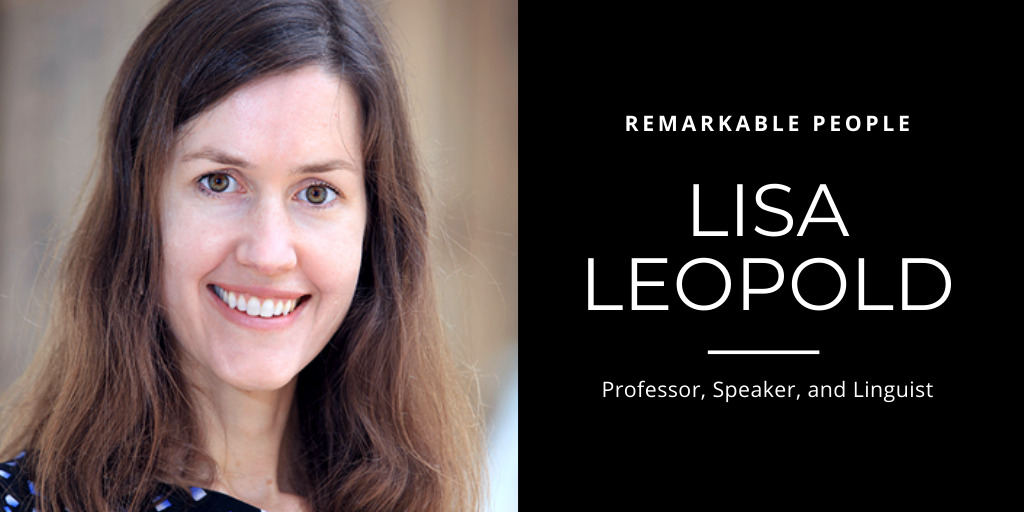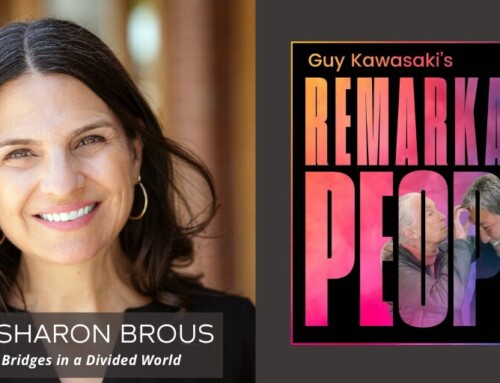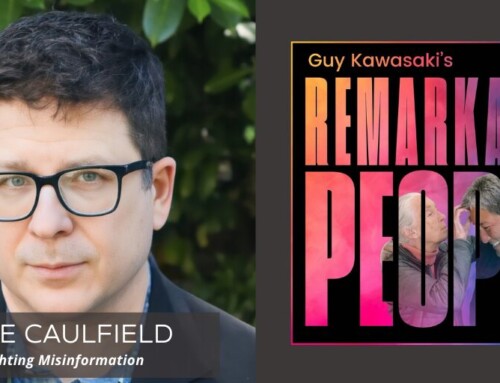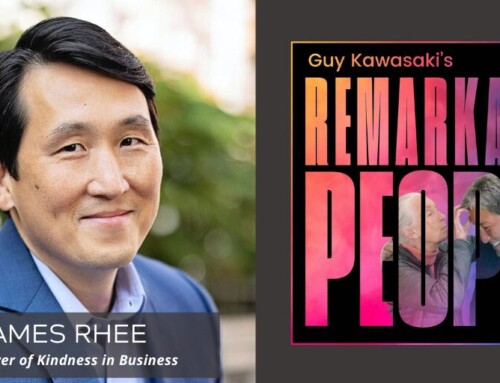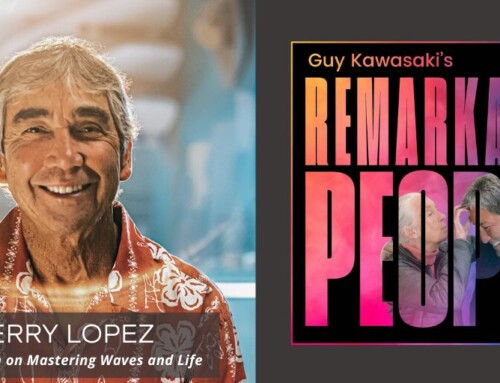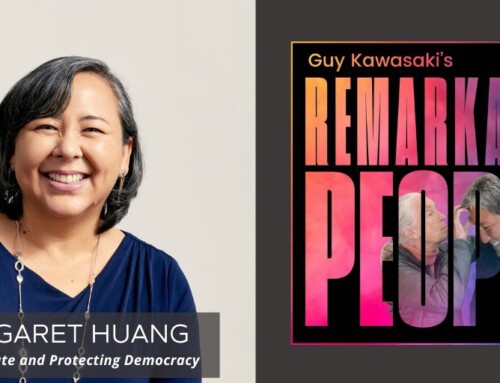Have you ever wondered if you know how to make a good apology? This episode’s remarkable guest is professor Lisa Leopold, and she will answer your questions about apologies and credibility.
Lisa is an associate professor at the Middlebury Institute of International Studies. She’s also the program coordinator for the Institute’s English for Academic and Professional Purposes Program.
She has an MA in teaching English to speakers of other languages from the University of Illinois at Urbana-Champaign and a BA from St. Olaf College. I first learned about Lisa’s work because of an article she wrote for the website called The Conversation.
This is a site that publishes articles only written by academics and researchers. It is the best source that I have found for credible factual and interesting articles.
I chatted with Lisa about:
- What makes a great TED talk
- How to pique your audience’s curiosity
- Breaking down the elements of a good story
- And the science of a good apology
Given how close we are to the election, this episode could not be more timely. We need to know who is credibly speaking. Please share with at least one person who would enjoy this.
Question of the week!
This week’s question is:
Question of the week: What do you think makes a good apology? #remarkablepeople Click To Tweet
Use the #remarkablepeople hashtag to join the conversation!
Where to subscribe: Apple Podcast
I'm Guy Kawasaki, and this is Remarkable People. Have you ever wondered if you know how to make a good apology? This episode's remarkable guest is Professor Lisa Leopold, and she will answer your questions about apologies and credibility. I'm Guy Kawasaki, and this is Remarkable People. My thanks to Jeff Sieh and Peg Fitzpatrick, who enhanced my credibility every week. I'm sorry that I can be difficult to work with. It is my fault when things don't go smoothly. My thanks also to the staff and contributors of The Conversation for their daily doses of great information. This is Remarkable People.
Enter your name and email address below and I'll send you periodic updates about the podcast.
Lisa is an associate professor at the Middlebury Institute of International Studies. She's also the Program Coordinator for the Institute's English for Academic and Professional Purposes program. She has an MA in teaching English to speakers of other languages from the University of Illinois at Urbana-Champaign and BA from St. Olaf College.
I first learned about Lisa's work because of an article she wrote for a website called The Conversation. This is a site that publishes articles only written by academics and researchers. It is the best source that I have found for credible, factual, and interesting articles.
I'm Guy Kawasaki and this is Remarkable People, and now here's my remarkable guest, Professor Lisa Leopold.
Lisa Leopold:
My specialty is in teaching English to speakers of other languages. I help students refine their academic and professional English language skills, and my students are international students from all over the world, and English is not their first language.
My students are already professionals, they're already master's degree’s students with significant professional experience, and their English language skills are very advanced. But English is not their first language and they need a little help with honing their academic and professional writing and speaking skills.
Guy Kawasaki:
I would say that there are many people with English as a first language who need to hone their English language skills. So what do you do for these students?
Lisa Leopold:
Well, I present them with authentic models from their fields and we analyze and critique those models, whether they are speeches or written pros. I help them discover what experts in their field do and that led me to my study of Analyzing What Experts in Foreign Affairs Do, which was published in The Conversation, so that they can choose to reject or embrace those strategies when projecting themselves as experts in their disciplines. So it's a lot of modeling, scaffolding of instruction and discussion in class of what the experts do.
Another activity that I might do is take some bites from TED Talks, like the openings of a half a dozen remarkable TED Talks, and I have my students analyze what makes those openings so captivating and then they can choose to apply some of those strategies when creating a remarkable introduction for their presentation.
Guy Kawasaki:
I want to go down this rat hole that you just opened up a little. So what, in your opinion, makes a good TED Talk introduction?
Lisa Leopold:
One that immediately builds a connection with the audience and one that piques the audience's curiosity. One that makes the audience wonder about something. So you can begin with, let’s say, a provocative question, and that's a technique that many people would recommend. But you have to ask yourself, “What makes a question provocative?” Not any question will be provocative.
If you ask the audience, "Who knows where France is?" I mean that's not going to pique their curiosity. But if you ask them something that's thought-provoking, that doesn't have a standard answer, that's more likely to pique their curiosity. It's not just the strategy that's used, rather. It's not just the question or the statistic or the story, but it's how that's used is the quality of it that makes a difference. So it's not any story that will get the audience's attention. It's one that makes them laugh. It's one that they can see themselves in because it's told with such vivid clarity.
Guy Kawasaki:
Can you cite some examples of particularly good opening questions?
Lisa Leopold:
Good questions might build consensus among the audience. It's one that which many people would agree to because that is a speakers purpose sometimes; they want to gain consensus from the audience. Or they want to make the audience wonder. So thought-provoking questions that make them wonder, or build their curiosity. One that does not have an immediate answer, and that will be answered in the remainder of the presentation. Those are some of the qualities that would make a good question.
Guy Kawasaki:
So based on what I just heard, if I open the talk by saying, "Have you ever wondered what it was like to work for Steve Jobs?"
Lisa Leopold:
Beautiful.
Guy Kawasaki:
Would that be a good question?
Lisa Leopold:
Beautiful.
Guy Kawasaki:
Yeah?
Lisa Leopold:
Yes, because very few people have had that experience of working for Steve Jobs, and many people would probably wonder what it is like. So it immediately captures attention.
Guy Kawasaki:
See? Already you've improved my speaking and we've only been recording nine minutes and twenty-six seconds, of which a third of that was debugging. So it's already been a remarkable podcast.
So you also mentioned a story at the start. So tell me the qualities of a good story.
Lisa Leopold:
One that has relatable characters. One that makes the audience laugh. One that uses dialogue among the characters. Those are some of the qualities that make entertaining story, and one that makes a meaningful story is one that has a lesson or a moral at the end of it.
Certainly the story should be told not just for entertainment, but it should have value for the presentation itself. There has to be a clear link between the message of the story and the presentation.
Guy Kawasaki:
Okay. So I'm going to rise to the challenge. Now, you listeners have to understand that I was not prepared to do this. I didn't know how this interview would go, but I'm going to try to wing it with you, okay Lisa?
Lisa Leopold:
Okay.
Guy Kawasaki:
So if I open up a talk by saying, "Have you ever wondered what it was like to work for Steve Jobs?" And then I transitioned to, "Well let me tell you a story. One day, I'm working in my cubicle, Steve Jobs shows up with someone I had never met before. He says to me 'Guy, what do you think of this product called Knoware?'” It was knowledge software truncated to a company called Knoware. “And I said, ‘Well, Steve, the company is mediocre, the product is mediocre. It's really not strategic for us, it's not that important for Macintosh's drill-in practice, boring software.’ Then Steve Jobs says to me, 'I want you to meet the CEO.' That's what it was like working for Steve Jobs." So on a scale of one to ten, how's that question and story to open up a talk?
Lisa Leopold:
I really like what you did, especially because there was a certain climax, or a shift, when he said that there was a surprise element of "I want you to meet the CEO." So at that moment I think the audience felt a sense of your nervousness of what that must be like, and so there was relatability there. You had a lot of dialogue, which I think is excellent. I might have cut some of your words of the explanation of your view of it just to make it a little more concise. So I would give it probably a nine point five.
Guy Kawasaki:
How about if I added a moral? Okay, and so the moral of the story is: always tell the truth.
Lisa Leopold:
Oh...Nice. Nice. Because it's a common adage, we hear that message throughout our lives, and you just illustrated it. The important point is to show rather than tell your listeners what the moral of the story is, and you succeeded by showing them at first, and then you told them and it was said in a very privy way, so I like it.
Guy Kawasaki:
All right, thank you. Wow. I feel better already.
Now, I read an article that you wrote, and... Well I read two articles that you wrote, which prompted me to call you, and the second one that I read is where I'd like to start. It was kind of the science of a good apology. So can you tell us what makes a good apology?
Lisa Leopold:
It should have, according to my research, three ingredients. It should have an explicit mention of the apology, it should claim ownership for the offense, and it should express empathy. Now, the effectiveness of the apology really does not stop there. There are other qualities that make an apology effective, but I narrowed it down to those three top ingredients based on research that I had conducted with dozens of infamous apologies over the past couple of years, and reading literature from business episus and from psychologists, and religious leaders, and all of the other fields, legal scholars, in which apologies are studied.
Guy Kawasaki:
So your "data" was not actually having people react to the apology; it was to look at the research from other professionals about the apology.
Lisa Leopold:
Correct. But there is research that has been conducted about people's most preferred strategies, and that research has indicated that most people - among 45,000 people surveyed - wanted to hear expressions of regret or responsibility.
Guy Kawasaki:
Last night, just by happenstance, I found an apology, and I want to read it to you and you tell me how good this apology is, okay?
Lisa Leopold:
Okay.
Guy Kawasaki:
So this was a photographer for the NBA, and he was in the NBA bubble, as it were, for teams so that they don't get the Coronavirus, and he posted a picture, regarding Joe Biden and Kamala Harris, that the picture says, "Joe and the hoe," okay? So that's what he posted, and obviously, he caught a lot of crap for that, and this is his public apology. I'll read it to you.
"I deeply regret posting on my Facebook page a phrase that I saw and copied from others as a sample of some people's reactions to Biden's selection of Senator Harris as his choice for VP. The phrase I posted does not reflect my personal views at all. I sincerely apologize to all those who have rightfully been offended. It was a horrible mistake on my part."
How was that as an apology?
Lisa Leopold:
Gosh, I wish I had the written text in front of me just to refer to it. You said it's in my email?
Guy Kawasaki:
I can put it in the chat right now.
Lisa Leopold:
Okay.
Guy Kawasaki:
So here, I'll send it to you right now. There. Do you see that?
Lisa Leopold:
Okay. Thank you.
Guy Kawasaki:
Through the chat- Yeah-
Lisa Leopold:
Thank you.
Guy Kawasaki:
Okay.
Lisa Leopold:
Let me start with the positive. Looking at this language, "deeply" is a good modifier for "regret", but some people would question the word "regret" because it does not indicate to all people a sincere apology. So analyzing the language a little bit more, "a phrase that I saw and copied from others," does not necessarily claim ownership in the way most people would want to hear that ownership claimed, because it's as though he did not commit the transgression, but other people did.
Guy Kawasaki:
Anything else?
Lisa Leopold:
Interesting, I'm- Sorry I'm re-reading it over.
Guy Kawasaki:
Okay.
Lisa Leopold:
So I'm looking at the language, "The phrase I posted does not reflect my personal views at all." So most people would question, then, why he said it. That sounds a bit insincere to most people. "I sincerely apologize to all of those who have…" that language is good, because again, the language "sincerely" is an enhancement to the word "apologize,” and the research says to name the people who have been offended, name them explicitly, so he attempts that.
“To all of those who have been rightfully offended. It was a horrible mistake on my part." I would not say that the word "mistake" is a good choice of language, because a mistake allows you to hide behind the transgression. It's a way of saying that, you can make a mistake for something very trivial, and you don't have to feel guilty about something that's just a mistake. So, the word "horrible" helps there a little bit, but not a mistake. That doesn't take ownership of the transgression.
Guy Kawasaki:
And, if you were he, and wanted to issue a great apology, what would you have said?
Lisa Leopold:
I would have started by making sure that I connect my actions and take ownership of them, and said something like, "I am accountable,” because here he's trying to deflect responsibility to others. He's just copied a phrase. So I would have shown directly that I am accountable for my words and I would have shown more repentance and I would have shown more empathy to those who have been hurt by this.
Guy Kawasaki:
Wow, that is so interesting to dissect an apology like that. Why do you think people have such a hard time saying that they're sorry and doing what you said are the components of a good apology?
Lisa Leopold:
It's difficult for all of us to own up to our mistakes and we think that it is a sign of weakness. That we did something wrong. But really, it's a sign of strength and research shows that leaders who apologize are judged more favorably than those who do not, but it's difficult. It requires ourselves to express our vulnerability and often times to the people who are closes to us, or in the case of a public apology, to people who have looked up to us. That's a very difficult thing for most people to do.
Guy Kawasaki:
Now, what if I were someone who was really sly and all of the above, and said "Okay I read Lisa's work, I understand the components of a great apology." And now you turn this person into a really slick apologizer who figures, "Well I can go do any kind of stuff I want and then, because I'm such a good apologizer, I'll be forgiven." Is that just too devious, or am I being too negative, or can that happen?
Lisa Leopold:
Somebody who wants to use the strategies without being sincere?
Guy Kawasaki:
And thinking that I can get away with a lot of crap because I am such a good apologizer.
Lisa Leopold:
I think people ultimately judge you by your actions, and not just by your words. So people will start to see through the façade of somebody who is a great apologizer but wants to commit all kinds of transgressions. I don't think that the general public would approve of that.
Guy Kawasaki:
Do you have someone who you consider a good public figure?
Lisa Leopold:
Well, there was a very good apology issued by the CEO of Starbucks a couple of years ago, when a couple of African American men were kicked out of Starbucks store. I recall that he said, "these two gentlemen did not deserve what happened and we are accountable - I am accountable." The reason why I liked that apology is because he explicitly assumes ownership for it. Even though he wasn't the one who kicked the individuals out of the Starbucks store, he still claims responsibility. So I like that apology for the use of the "I" language and the claiming of ownership.
Guy Kawasaki:
Dare I ask you for the hall of fame of the worst apologizers in the public eye?
Lisa Leopold:
Oh gosh. There are many that I would say that don't meet these standards. One that is really weak was used by Mark Zuckerberg amidst the Cambridge Analytica scandal, and he said, "I'm really sorry that this happens" and for a CEO to use such weak language "that this happens," not naming what “this” was, and also as though he had no control over what occurred, that's very weak.
There was another one by Charlie Rose amidst all of the allegations that came out. He said something along the lines of emphasizing his own personal growth and that is not what people wanted to hear. They want to hear empathy for those who have been hurt, not that he's grown from these experiences. But there are so many weak ones for different reasons.
Generally if you hear an apology using the conditional "if," like, "I apologize if anyone was offended." That does not claim ownership. If you hear the passive voice used rather than the active voice, that also weakens ownership. And a really famous technique that many people are aware of is the "but" following an apology because it negates what you just apologized for.
Guy Kawasaki:
Well, I hope that every publicist in the world reads that article or hears this podcast because you know that these powerful people with their people are sitting around crafting these things. It's hard to be understanding of what they're doing. They're manipulating us, right?
Lisa Leopold:
They're using language strategically, we'll put it that way.
Guy Kawasaki:
I think you just used the word "strategically" strategically, but okay. Okay, but enough about apologies. Now, the article that truly brought me to you is this article about projecting credibility. So the question I have to ask is, how does one project credibility? And in two conditions. One is in person, and the other is virtually.
Lisa Leopold:
Okay. Well, I think the verbal strategies for enhancing credibility become much more important when delivering a presentation remotely because you can't exactly strut across the stage or gesture broadly to the slide deck behind you when you appear in a small box on someone's laptop or iPhone screen and you don't even know if they're watching you in the first place. They might be going to the kitchen to prepare a cup of coffee. You really don't know what they're doing on the other end. So in this case, verbal strategies are so much more important.
In person, much research indicates that non-verbal strategies communicate a very powerful message for credibility. There are other techniques for building credibility as well, audience interaction. And that becomes a little more difficult virtually. Sure, it can be done but not in the same way you can see your audience right in front of you raising their hands in response to your question. So I think we really need to pay closer attention to the verbal strategies for enhancing credibility when we present remotely, but they are also important in face-to-face communication.
Guy Kawasaki:
So can we get really tactical and get some actual tips. Maybe not necessarily a check-list, but these are the things that increase your credibility virtually.
Lisa Leopold:
Well, in the article, in my research, I've outlined eleven strategies that foreign affairs experts use, which appear to enhance credibility. I do want to emphasize that word "appear" because these have not been tested on audiences to judge their reactions to the techniques but they have been analyzed across, my corpus totaled over 350,000 words, and many experts in the field of foreign affairs use these techniques and they include - I can list all eleven if you would like me to.
Guy Kawasaki:
In a sense, I'm asking you aa question that I know the answer to, but people who are listening don't know the answer to this question. I would love to bring it out, yes.
Lisa Leopold:
Okay. They include the emphasizing prestigious affiliations, prestigious titles - whether they are past or current titles that you've held - emphasizing your disciplinary expertise, so in essence, showing that you are a member of a professional community. Emphasizing your professional identity. Highlighting your professional experience and accomplishments. Talking about your educational credentials. Citing previous comments that you've made, especially if you've made them publicly. Highlighting prominent connections that you have. Emphasizing your professional reputation, and disclosing elements of your personal background that are relevant to the topic. Those are the eleven strategies for enhancing credibility.
It's interesting, Guy, because although my research focused on foreign affairs experts, I was very curious to see whether these strategies were used by others. I haven't delved deeply into that research of whether they've been used by others, but I thought that I would do something fun when I was listening to some of the Remarkable People podcast and see whether some of your guests were using these techniques, and indeed, they were.
Professor Wineburg used self-citation when he said, "and I'm on record as being a critic," and he was speaking of the AP exam. Steven Pinker mentioned prominent connections when he said that he knows democratic candidates personally. Many people talked about their professional accomplishments. Going back to Professor Wineburg, he mentioned that one of his studies was published in Time Magazine. Even you, Guy Kawasaki, you use this.
Guy Kawasaki:
I do?
Lisa Leopold:
When you said that you were on the Board of Trustees of Wikipedia in one of your podcasts. So there's a general misconception, I think, that the higher in the hierarchy you go, and the more stature you have, you don't need these techniques because your credibility speaks for itself. I mean, we would think that amongst these famous individuals but they're still using them.
What I think that people with stature also do, is they recognize the limitations of their expertise. We heard Steven Pinker do that when he said that he would not give advice in certain areas because he's not an expert in those areas. We also hear people who are famous expressing vulnerability or failure as a way to connect with the audience. So they're not just talking about their accomplishments, but they're talking about their struggles as well.
Kristi Yamaguchi in your podcast talked about how she came in 11th out of 12th in a figure skating competition when she was seven years old, and audiences love that kind of story. It's the same kind of story that Michael Jordan was cut from his basketball team, or Steve Jobs was fired from a company that he started. People love these kinds of stories because it's kind of like the rags to riches theme. People can rise above these challenges. That's what I think we hear famous people do, or well-known people do. They also express their failures and struggles, not just their accomplishments.
This misconception that people who are well known, or people who are already credible don't need to rely on these techniques. I think this debunked when we really listen to their language. They are using these techniques as well.
Guy Kawasaki:
May I make an observation/question, which is, I think that women are particularly poor users of this technique. Do you think that's true?
Lisa Leopold:
There's something called the gender credibility gap, which is that men are perceived as more credible than women. A study published some years ago indicated that eight percent of women believe that men are more credible in the work place, or deemed more credible. Many people buy into this concept, and other research shows that women are more affected by stereotypes of modesty, indifference, and tend to succumb to those, and tend to be judged more negatively or more harshly if they engage in bragging, whereas a man who promotes himself is just seen as more competent. So those are probably some of the reasons why women are more reluctant to use these techniques.
What's ironic is that the examples that I chose from my article, and I wasn't cherry-picking based on gender, but I used more examples from women than from women, which just shows that women are still using these. Women with competence or expertise are still using these strategies.
We don't always feel comfortable. We - meaning women and men - may not always feel comfortable promoting themselves. Many people would agree that humility is a virtue, pride is not, but we tend to accept for ourselves that there are situations in which self-promotion is necessary and those include when you're on a job interview, or when you're negotiating with your boss for a pay-raise, or when you're writing your annual review at work, or when you're delivering a high-stakes presentation.
Do you ever want to present yourself less than your most competent and confident self? Most people would answer no. So then, these strategies become important. They're not ones that I would recommend that you use with people who are your closest friends because you don't need to prove yourself to them, but when people are unfamiliar with you, or when the presentation or situation is so high-stakes that you need to project your credibility, I highly recommend that you use these strategies.
Guy Kawasaki:
What if a woman pushes back and says, "Well, I've tried to do some of these things and I was judged unfairly, as arrogant, full of myself, angry, overly aggressive, et cetera, et cetera, things that would never happen to a man doing the same thing. So, I'm hesitant to use these techniques."
Lisa Leopold:
This calls for societal shift. We need to start creating conditions that make women feel comfortable promoting themselves. Women themselves, or ourselves, need to feel comfortable using these strategies. Amy Cuddy, in her TED Talk, talks about fake it until you become it. She's speaking about non-verbal communication strategies, and project yourself as a powerful individual non-verbally until you feel that way. I would argue, “Let’s do that with verbal strategies as well. Try them out. See if you become, or feel, more powerful using them.”
Guy Kawasaki:
Would you care to list some examples of women who do this well so that women can observe them?
Lisa Leopold:
Suzanne Maloney, I quoted her in my article, and I have looked at her texts, transcripts of her speeches, not only on my research that covered six months of panel presentations at the Brookings Institution, but prior to that. One example that I like that she said that's outside of this current scope is, "as a colleague in the State Department during the Bush Administration, once told me..." And then she goes on to make her point. She's linking herself to prominent individuals and thereby, enhancing stature. Not all of us have colleagues in the State Department.
She also uses an example, "if one reads The Washington Post," and thereby, creating a divide between those who are well informed and those who are less well informed, and she's in the well-informed camp, because she indeed reads The Washington Post. I really like how she uses language.
Guy Kawasaki:
So it's like I asked you about someone becoming extremely smooth at apologizing, is there any danger of someone taking your list of eleven things and carefully scripting into their tele prompt or speech, maybe not all eleven points, but hitting as many points as they can?
Lisa Leopold:
I don't think the goal is about hitting as many points as can because if you do you probably sound pretty arrogant, if you try to do all eleven in a single talk, but certainly integrating some of them, and I think the important point is to integrate them within a sentence, not make them the focal point or foreground them in a separate sentence.
You don't want to say, "I had a colleague in the State Department during the Bush Administration,” period, because that's not the point of the talk and that does make you sound arrogant. So you want to integrate it smoothly into your presentation within a sentence so that if you removed it from the sentence, the sentence would still make rational sense.
Some of these techniques actually make you sound less arrogant while building your credibility. "We see" is one of those techniques because it builds inclusivity with the audience rather than, say, "I observe" or "I see," which puts the attention on you but it also, at the same time, links you with other experts, so it makes you appear less biased. So it builds your credibility and it builds a connection with the audience.
The same can be said for the technique "if you." So Esther, in your podcast, the famous teacher, she said "If you read chapter three of Malcolm Gladwell's book, blah blah blah," well that indicates that she did read chapter three of Malcolm Gladwell's book, but she doesn't state it out right. She says, "if you." So some of these techniques actually make you sound less arrogant, while building your credibility. So they can be used successfully that way too, but if you try to use all eleven strategies in a single speech, I think the audience will judge you as a little bit arrogant.
Guy Kawasaki:
So, I shouldn't open up a speech by saying, "Well, prior to my stint as a trustee of the Wikipedia Foundation, I worked for Apple and Steve Jobs, and this was right after I graduated from Stanford."
Lisa Leopold:
You don't want to overdo it. Right.
Guy Kawasaki:
So, a flip side question is, how does one determine or recognize fake credibility?
Lisa Leopold:
Well I think it's similar to recognizing a fake apology. I mean, ultimately, we judge people by their actions and not just their words. So if we look at a person's actions and whether they really prove themselves to be instrumental to a team in a workplace then, they have achieved the true sense of credibility regardless of what they say about themselves.
So ultimately, I think it does boil down to your actions. Or, if we take a look at your character, your integrity, do you follow through on promises made, that's another aspect of credibility. So we really need to get beyond the words, but words do matter and they do have the ability to build our stature, tarnish our reputation. Words can heal or fracture relationships. The point I'm making is that words matter, but they're not everything.
Guy Kawasaki:
Let's say that a presidential candidate calls you up and says, "I've read both articles. I love what I read. Do you have any advice for how I ask people to vote for me?"
Lisa Leopold:
Well, multiple studies link persuasion and credibility. The goal of presidential candidates is to be persuasive and win votes. So if we take a step back, they need to be credible. So we ask ourselves do they follow through on promises. That's very important for presidential candidates. We go through the checklist of actions that people want to see and then if we look at crafting language, again, credible individuals are using these techniques, but they have not been tested on the general public. So presidential candidates are also trying to win votes of people that come from a wide variety of backgrounds.
So this goes beyond the scope of my research and it steps into another territory, but something that I heard Obama use when he was president is he particularly integrated examples that come from many different parts of the United States. He wasn't focusing on a single region of the United States. He was focusing on various regions, geographically, and he was using the names of individuals and reciting stories, and these were ordinary individuals. They weren't famous individuals. They weren't well known people. He was talking about their struggles as a way of identifying with them.
I think politicians have a slightly different objective or goal than we do when delivering high stakes presentations and people may not know us, and we want to project our credibility, we want to project our most confident and competent self. Presidential candidates need to connect with the general public, and reciting struggles that the common American has. Maybe it's facing a loss of jobs right now because many people are having their livelihoods tested with the corona virus. Those are the things that presidential candidates really need to emphasize to build that connection.
Guy Kawasaki:
Let’s critique Anthony Fauci. How is he on the credibility scale?
Lisa Leopold:
Most people would think that given his background that he is extremely credible. He integrates research into his responses and he cites it. He uses the tactic of self-citation, talking about he was on records saying blah, blah, blah. So that's one of the techniques that I've pointed out in building credibility. I would say that he has credibility in the general public's view.
Guy Kawasaki:
Then why do so many people, or at least my perception is, why do so many people believe politicians who have zero scientific or medical credibility?
Lisa Leopold:
I think it's very hard for people to dissociated themselves from their views that are deeply entrenched. So you may have a strong support for particular candidates, and very little that that candidate does will get you to change your mind. Many people hold tightly to values or opinions that they have and are not swayed easily. Some candidates have a knack at speaking with confidence, but not necessarily with substance.
Guy Kawasaki:
Okay. That's a very smooth answer. Okay, so I'm going to let you off the hook now. I've truly found this valuable for myself too, not that I'm going to introduce myself trying to hit all eleven points. Do you have any closing wisdom for my listeners?
Lisa Leopold:
I would say that your audience wants to know that the messenger, and not just the message, is critical. Many of us focus so much on making our message credible, having the facts, the data, the statistic to support us, but we don't focus our attention on building our own credibility. I think we need to pay attention to it when presenting to an unfamiliar audience.
The second point that I would make, that I've made previously in the podcast is that words matter, perhaps more than we may think they matter. I would also say that to naysayers that these strategies do not replace the importance of competence, they simply enhance competence.
Guy Kawasaki:
Now here's a couple great comments.
“Thank you for featuring female founders,” by Princessbread. "This is what a sixty-year-old dude can do best, to place a spotlight on female founders, show our struggles and let us tell our stories so that younger females can learn and be inspired. I've learned so much by your interviews with Katherine and Melanie, and would like to hear more from female founders. I need more tools in my bag for this journey.
Next, "One of the best podcasts,” by Lucacolorado "If you want to peer into the minds of people achieving remarkable things, Guy Kawasaki is the guy you've been looking for. Recommended podcasts for all ages."
Thank you, appreciate those two comments. Please, go to the Apple podcast app and write a review.
If this information form Lisa doesn't enhance your credibility, I don't know what will. I found her advice extremely practical and tactical. I'll be changing my speeches and presentation because of this interview.
Remember, wear a damn mask, wash your hands, don't go to crowded places, and don't trust any decision made when Tony Fauci is under general anesthesia.
Sign up to receive email updates

